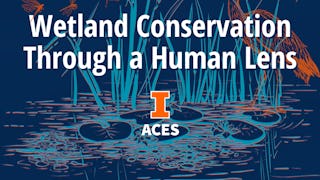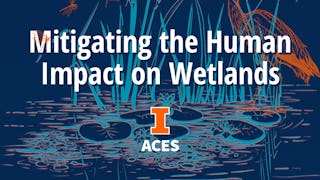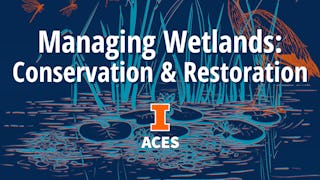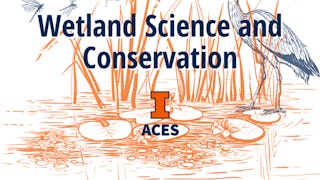This course explores wetland conservation through legal, ecological, and policy perspectives. Learners will examine the regulatory roles of federal, state, and local governments, with a focus on the Clean Water Act (CWA) and Waters of the United States (WOTUS). Global conservation efforts, including the Ramsar Convention, will be analyzed in relation to sustainability objectives. Through case studies, learners will assess factors shaping wetland management, the role of community participation, and adaptation to climate change. The course also evaluates engineering-based and hybrid solutions for enhancing wetland resilience. By the end, learners will develop a critical understanding of wetland conservation challenges and strategies in both U.S. and international contexts.



Wetland Regulation: Local to Global Perspective
This course is part of multiple programs.

Instructor: Caitlin Bloomer, Ph.D.
Included with 
What you'll learn
Contrast federal, state, and local regulatory roles in wetland conservation, focusing on CWA and WOTUS.
Analyze international conservation laws and conventions, including Ramsar, and their link to sustainability.
Evaluate wetland management factors, community participation, and resilience strategies against climate change.
Details to know

Add to your LinkedIn profile
February 2025
6 assignments
See how employees at top companies are mastering in-demand skills

Build your subject-matter expertise
- Learn new concepts from industry experts
- Gain a foundational understanding of a subject or tool
- Develop job-relevant skills with hands-on projects
- Earn a shareable career certificate


Earn a career certificate
Add this credential to your LinkedIn profile, resume, or CV
Share it on social media and in your performance review

There are 4 modules in this course
You will become familiar with the course, your classmates, and our learning environment. The orientation will also help you obtain the technical skills required for the course. Following the orientation, you will begin Module 1. This module explores the roles of federal, state, and local U.S. governments in wetland conservation, highlighting their distinct regulatory authorities. It traces the history of the Clean Water Act (CWA) and the evolution of the "Waters of the United States" (WOTUS) definition. Learners will gain an understanding of how federally regulated wetlands are identified and the legal frameworks guiding their protection.
What's included
12 videos7 readings2 assignments1 discussion prompt
This module examines the role of international law in advancing environmental conservation efforts. It explores the legal and ecological significance of key conservation conventions, with a particular focus on the Ramsar Convention on Wetlands. Learners will evaluate the successes and challenges of Ramsar in promoting wetland conservation worldwide, emphasizing its impact on biodiversity and sustainable development.
What's included
11 videos3 readings1 assignment
This module explores the critical connection between wetland conservation and global sustainability objectives, such as climate resilience and biodiversity preservation. Learners will evaluate the diverse factors influencing wetland management across different ecological, cultural, and socio-economic contexts. Through case studies, the module contrasts the successes of wetland management initiatives, highlighting the role of community participation in achieving sustainable outcomes.
What's included
11 videos3 readings1 assignment
This module focuses on the need for adaptive strategies in wetland management to address human pressures and the impacts of climate change. Learners will assess engineering-based and hybrid solutions designed to enhance wetland resilience in changing environments. Through case studies from various regions in the United States, the module provides a critical evaluation of innovative approaches to wetland adaptation and their effectiveness.
What's included
11 videos5 readings2 assignments
Instructor

Offered by
Recommended if you're interested in Environmental Science and Sustainability

University of Illinois Urbana-Champaign

University of Illinois Urbana-Champaign

University of Illinois Urbana-Champaign

University of Illinois Urbana-Champaign
Why people choose Coursera for their career





Open new doors with Coursera Plus
Unlimited access to 10,000+ world-class courses, hands-on projects, and job-ready certificate programs - all included in your subscription
Advance your career with an online degree
Earn a degree from world-class universities - 100% online
Join over 3,400 global companies that choose Coursera for Business
Upskill your employees to excel in the digital economy
Frequently asked questions
Yes! Although completion of the Coursera course alone is not credit-bearing, it is a required component of a graduate-level Canvas course that can be "stacked" toward advanced credentials such as an academic (transcriptable) graduate certificate or a degree. If you decide to pursue further education, the credits you earn from this course can be applied toward a formal academic program, provided that you meet all the requirements of admission to the certificate or degree. Learn more about the Wetland Science and Conservation Graduate Certificate.
Access to lectures and assignments depends on your type of enrollment. If you take a course in audit mode, you will be able to see most course materials for free. To access graded assignments and to earn a Certificate, you will need to purchase the Certificate experience, during or after your audit. If you don't see the audit option:
The course may not offer an audit option. You can try a Free Trial instead, or apply for Financial Aid.
The course may offer 'Full Course, No Certificate' instead. This option lets you see all course materials, submit required assessments, and get a final grade. This also means that you will not be able to purchase a Certificate experience.
When you enroll in the course, you get access to all of the courses in the Specialization, and you earn a certificate when you complete the work. Your electronic Certificate will be added to your Accomplishments page - from there, you can print your Certificate or add it to your LinkedIn profile. If you only want to read and view the course content, you can audit the course for free.
More questions
Financial aid available,

